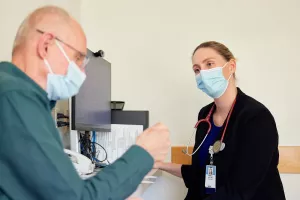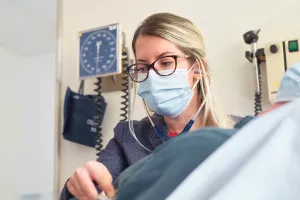Cardiac sarcoidosis is a rare disease where the immune system causes clumps of cells, called granulomas, to form in the heart. These granulomas lead to inflammation and can interfere with the heart's electrical system, which controls the heartbeat.
Comprehensive care for cardiac sarcoidosis
The immune system helps protect your body from diseases and infections. When you're sick or dealing with certain conditions, it makes white blood cells to fight harmful substances.
Sometimes, the body makes too many white blood cells. These extra cells gather and cause swelling in the organs and tissues they’re meant to protect. This condition is called sarcoidosis. When it affects the heart, it’s called cardiac sarcoidosis. In this rare condition, small clumps of inflammatory cells, called granulomas, form in the heart. These granulomas can disrupt the heart's electrical system and its ability to pump blood, leading to symptoms like irregular heartbeats, dizziness and shortness of breath.
Though there isn’t a cure for cardiac sarcoidosis yet, there are ways to reduce inflammation and ease symptoms. At Tufts Medicine, comfort and wellness are at the heart of your care plan.

Conditions
The cause of cardiac sarcoidosis is not known. Some researchers think it may be linked to exposure to things like mold, pesticides or bacteria. The tricky part is that the symptoms of cardiac sarcoidosis can look like other heart problems, like heart failure or a heart attack. The buildup of granulomas can sometimes cause:
- A block in the heart’s electrical system
- A fast heart rhythm called ventricular tachycardia
- Weakness in the heart’s pumping ability
These granulomas can disrupt the heart's electrical system and its ability to pump blood, leading to symptoms like irregular heartbeats, dizziness and shortness of breath. If you’re having any of these symptoms, it’s important to see your doctor. If you think you’re having a medical emergency, call 911 right away.
Testing
Since the symptoms of cardiac sarcoidosis are similar to other heart diseases, we offer thorough testing to help diagnose what’s going on.
One effective test is the myocardial FDG/PET scan. This scan uses a small amount of radioactive material to create a clear image of your heart and show where inflammation is happening. We use this test to both diagnose cardiac sarcoidosis and track how you’re responding to treatment.
We might also use other important heart tests, such as:
- Cardiac MRI scan
- Echocardiogram
- Electrocardiogram
- Heart rhythm monitor
Your doctor may also order blood tests to check the health of your organs. In some cases, we may take a small sample of tissue from an enlarged lymph node or heart to confirm if you have cardiac sarcoidosis.
Treatments
Treating cardiac sarcoidosis takes a team of experts. At Tufts Medicine, that team includes specialists in rheumatology, electrophysiology, heart failure and pulmonology.
Our main goal is to reduce inflammation before it causes serious damage to the heart. In some cases, inflammation goes away on its own without treatment. For others with ongoing inflammation, we consider your health history, personal goals, and level of inflammation when planning treatment.
Treatment options may include medications such as:
- Intravenous infusions like infliximab (Remicade®)
- Methotrexate (a chemotherapy drug)
- Steroids like prednisone
Locations

From regular office visits to inpatient stays, find the healthcare you need and deserve close to home.

Meet the doctors and care team devoted to supporting you every step of the way along your path to better health.